Chinese Nationalist Party (KMT) Chairwoman Hung Hsiu-chu (洪秀柱) yesterday said she would not withdraw from the KMT chairperson race, despite calls from a group of retired public servants for her to drop out and endorse former Taichung mayor Jason Hu (胡志強).
The Association of Retired Public Servants, Teachers, Military and Police of the Republic of China has been collecting signatures for a statement titled “Saving the KMT: Chairperson Hung’s unavoidable responsibility,” local media reports said.
The statement urges Hung to give up her re-election bid in favor of running in the 2020 legislative elections. It invites all chairperson candidates to undergo a “coordination process” to decide the winner instead of by vote in May.
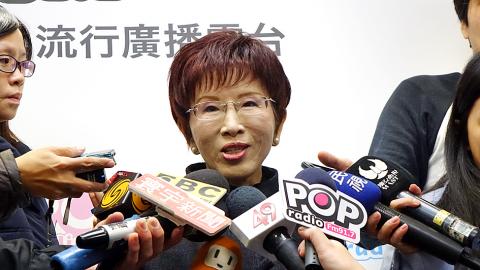
Photo: George Tsorng, Taipei Times
The association recommends that Hu be tapped for the party’s top post and calls on former vice president Wu Den-yih (吳敦義), also a chairperson candidate, to run in the 2020 presidential election.
While the association had expected the May election to foster party solidarity, it is turning out to be “unimaginably cruel,” the statement said, adding that party members are asking why the KMT has not been able to improve its poll numbers despite the poor performance of the Democratic Progressive Party government.
The association openly supported Hung during the chairperson by-election in February last year, when she ran against then-acting chairperson Huang Min-hui (黃敏惠), Taipei City Councilor Lee Hsin (李新) and KMT Legislator Apollo Chen (陳學聖).
The main proponents of the statement are said to include former Examination Yuan secretary-general Lin Shui-chi (林水吉), former secretary general of the Huang Fu-hsing (黃復興) military veterans’ branch Hu Chu-sheng (胡筑生) and former chief secretary of the legislature’s Judiciary and Organic Laws and Statutes Committee Chen Rong-yang (陳榮洋).
Hung said in a radio interview that it was not possible for her to follow the group’s wishes.
She said those calling for her to quit were a “minority” within the association, as “there have been association members telling [her] that they were upset about the statement because it was not collectively discussed.”
When asked about her cross-strait policy, Hung reiterated that she has not proposed scrapping the latter half of the “one China with different interpretations” doctrine, the KMT’s orthodox stance on cross-strait relations.
“‘One China, different interpretations’ is included in the ‘1992 consensus,’” she said.
When asked to explain why she is promoting “one China, same interpretation” if she is not against “one China, different interpretations,” Hung said she meant that “in the future, following cross-strait negotiations, both sides could walk on a path that both jointly agree to take.”
Hung said she looks forward to a civil and democratic competition and is not worried about a possible overlap between her voter base and that of former KMT legislator Pan Wei-kang (潘維剛), who earlier this week said that she has been encouraged to run and is giving it serious thought.
With her family background, Pan — along with KMT Vice Chairman Hau Lung-bin (郝龍斌), son of former premier and army general Hau Pei-tsun (郝柏村) — is said to have the potential to draw away votes for Hung from the Huang Fu-hsing branch.
“All candidates have some kind of voter base overlap,” Hung said.
If Pan joins the race, she would be the sixth aspirant, following Hung, Wu, Hau, former vice chairman Steve Chan (詹啟賢) and former Taipei Agricultural Products Marketing Corp president Han Kuo-yu (韓國瑜).
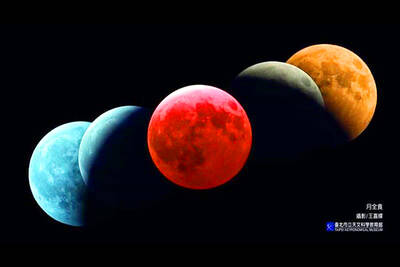
A total lunar eclipse coinciding with the Lantern Festival on March 3 would be Taiwan’s most notable celestial event this year, the Taipei Astronomical Museum said, urging skywatchers not to miss it. There would be four eclipses worldwide this year — two solar eclipses and two lunar eclipses — the museum’s Web site says. Taiwan would be able to observe one of the lunar eclipses in its entirety on March 3. The eclipse would be visible as the moon rises at 5:50pm, already partly shaded by the Earth’s shadow, the museum said. It would peak at about 7:30pm, when the moon would
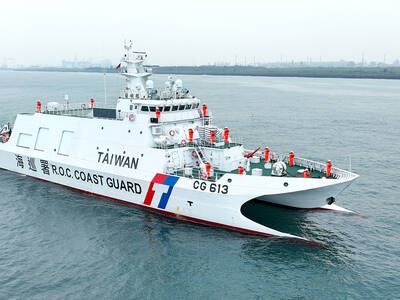
The Coast Guard Administration (CGA) yesterday held a ceremony marking the delivery of its 11th Anping-class offshore patrol vessel Lanyu (蘭嶼艦), saying it would boost Taiwan’s ability to respond to Beijing’s “gray zone” tactics. Ocean Affairs Council Deputy Minister Chang Chung-Lung (張忠龍) presided over the CGA event in the Port of Kaoshiung. Representatives of the National Security Council also attended the event. Designed for long-range and protracted patrol operations at sea, the Lanyu is a 65.4m-long and 14.8m-wide ship with a top speed of 44 knots (81.5kph) and a cruising range of 2,000 nautical miles (3704km). The vessel is equipped with a
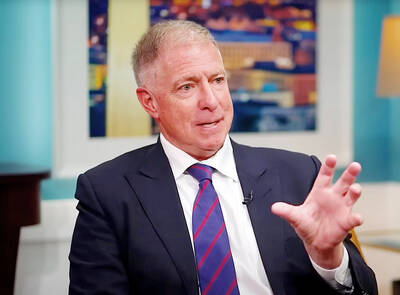
DEFENSE: The US should cancel the US visas or green cards of relatives of KMT and TPP lawmakers who have been blocking the budget, Grant Newsham said A retired US Marine Corps officer has suggested canceling the US green cards and visas of relatives of opposition Taiwanese lawmakers who have been stalling the review of a proposed NT$1.25 trillion (US$39.7 billion) special defense budget. The Executive Yuan has proposed the budget for major weapons purchases over eight years, from this year to 2033. However, opposition lawmakers have refused to review the proposal, demanding that President William Lai (賴清德) first appear before the Legislative Yuan to answer questions about the proposed budget. On Thursday last week, 37 bipartisan US lawmakers sent a letter to Legislative Speaker Han Kuo-yu (韓國瑜), the heads
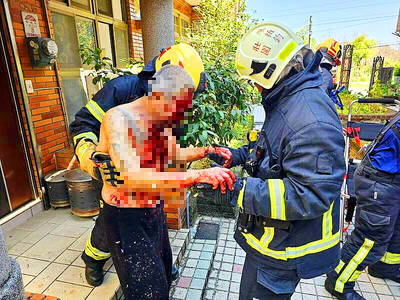
Two siblings in their 70s were injured yesterday when they opened a parcel and it exploded, police in Yilan said, adding the brother and sister were both in stable condition. The two siblings, surnamed Hung (洪), had received the parcel two days earlier but did not open it until yesterday, the first day of the Lunar New Year holiday in Taiwan, police said. Chen Chin-cheng (陳金城), head of the Yilan County Government Police Bureau, said the package bore no postmark or names and was labeled only with the siblings’ address. Citing the findings of a